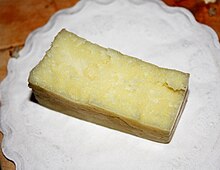Kashkaval
| Kashkaval | |
|---|---|
 |
|
| Source of milk | Cow, Sheep |
| Pasteurised | Traditionally, no |
| Texture | Semi hard |
Kashkaval is a type of yellow cheese made of cow milk (kashkaval vitosha), sheep milk (kashkaval balkan), or both (kashkaval preslav). The name is derived from the Italian caciocavallo (Romanian: cașcaval, Bulgarian: кашкавал, pronounced [kɐʃkɐˈvɑɫ], Macedonian: кашкавал, pronounced [kaʃkaˈval]; Turkish: kaşkaval/kaşar, Serbian: качкаваљ or kačkavalj; Albanian: Kaçkavalli). In Albania, Bulgaria, Republic of Macedonia, Serbia and Romania, the term is often used to refer to all yellow cheeses (or even any cheese other than sirene). In English-language menus in Bulgaria, "кашкавал" is translated as "yellow cheese" (whereas sirene is usually translated as "white cheese" or simply "cheese").
The name kashkaval comes from Latin caseus (cheese) and caballus (horse). According this theory for the Italian name caciocavallo, the widely accepted explanation of the word "cavallo" (horse in English) comes from the cheese being traditionally dried by attaching two gourd shaped balls of caciocavallo with a single rope and hanging them to a wooden pole as if placed on a horse's back.
...
Wikipedia
